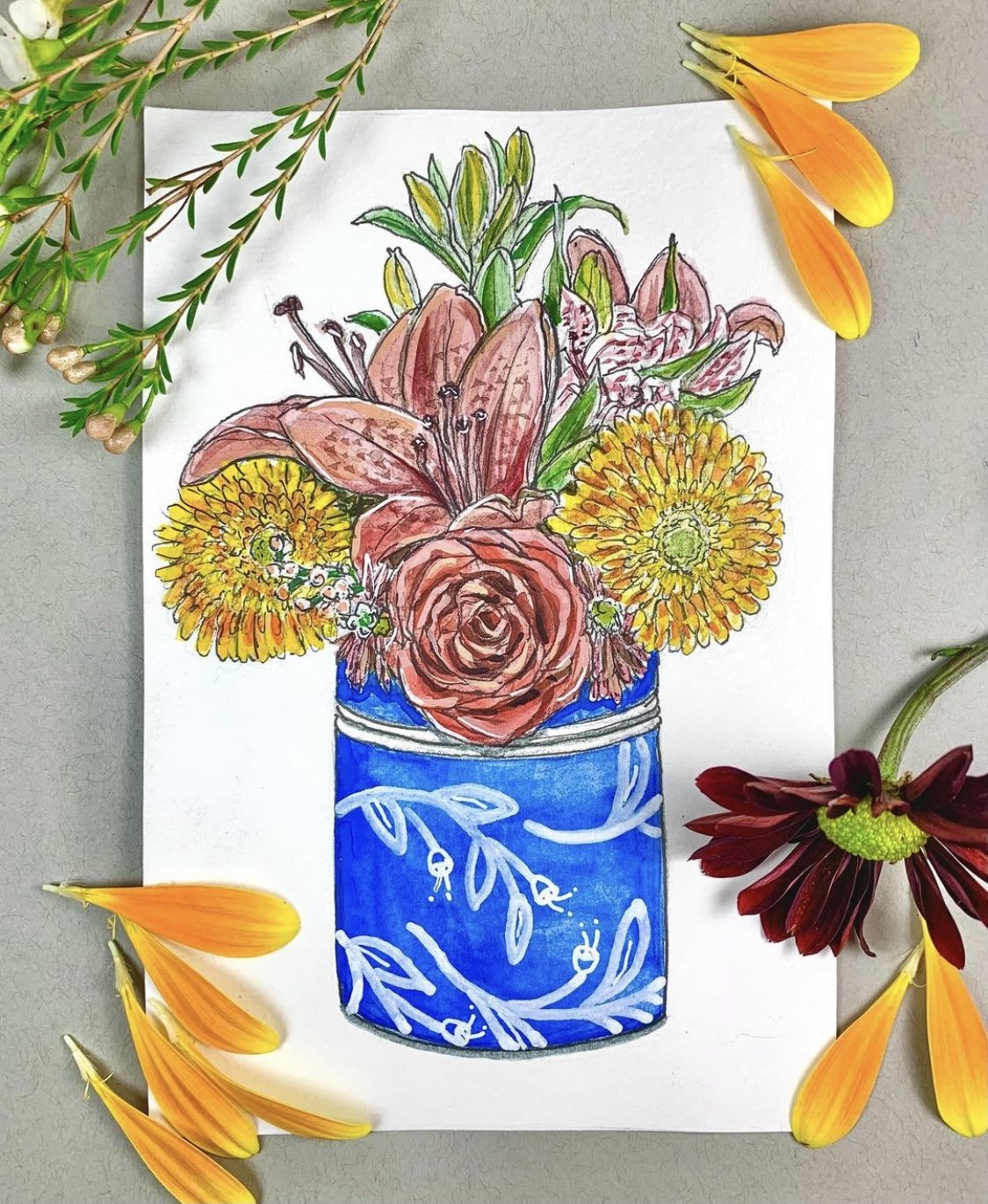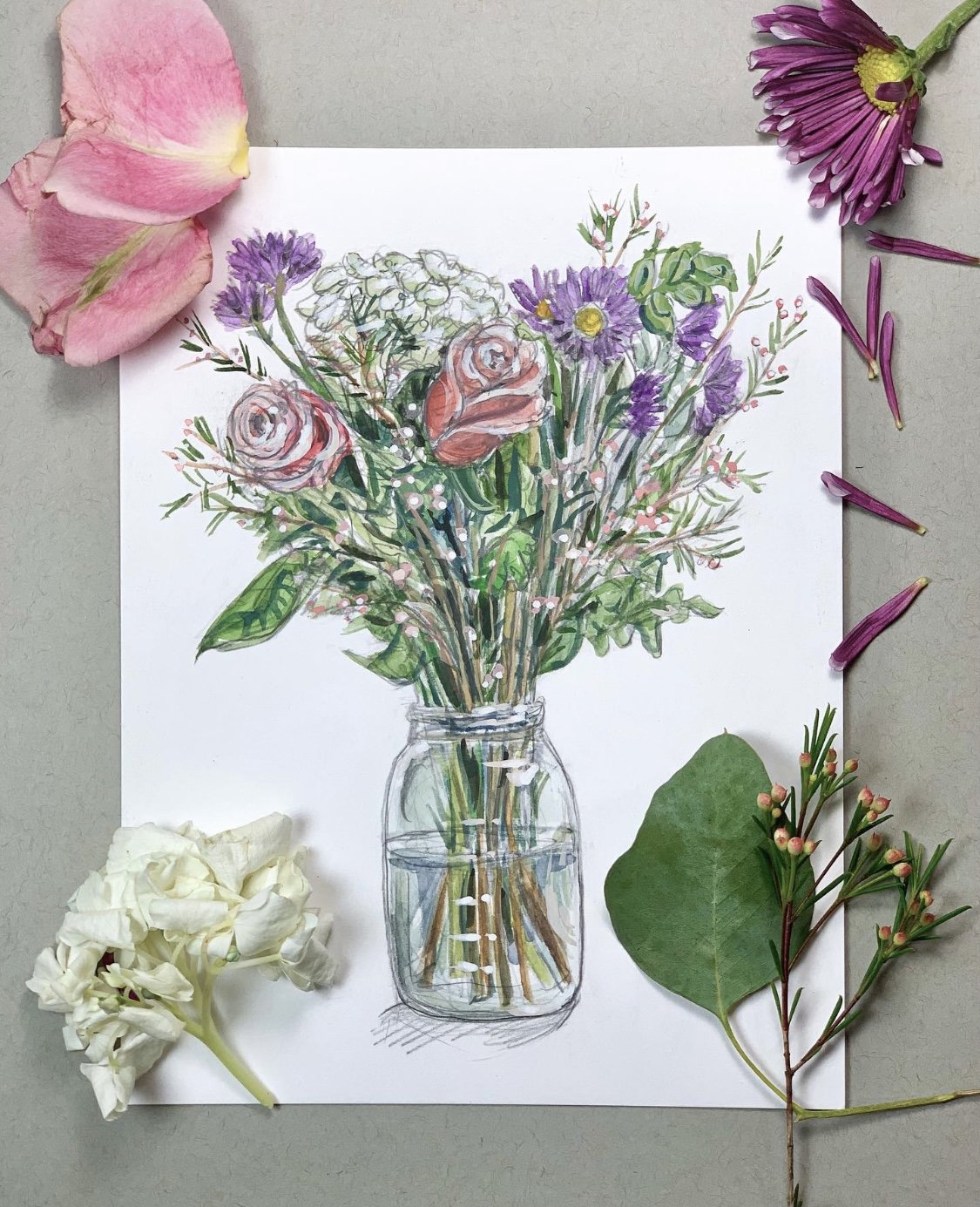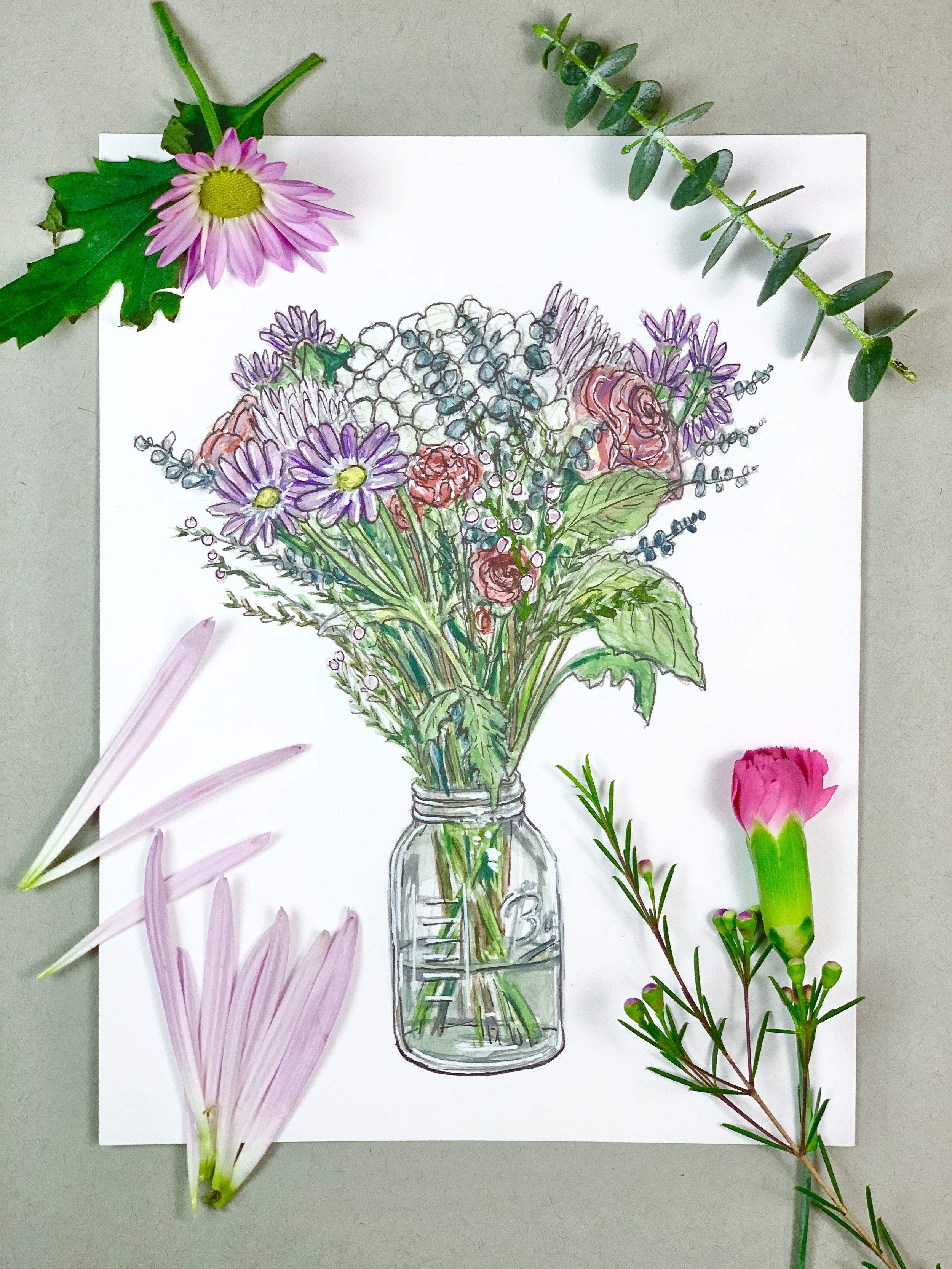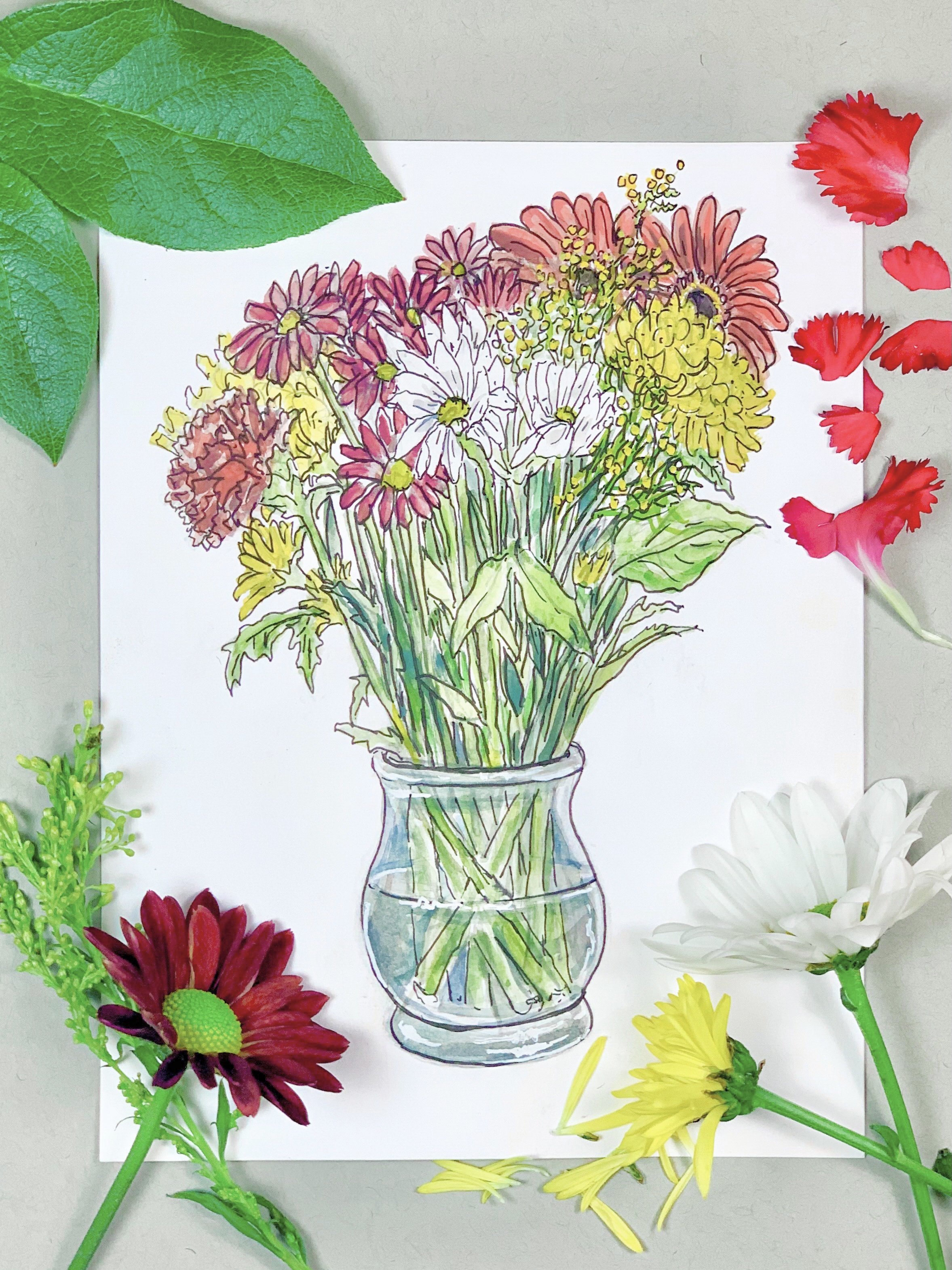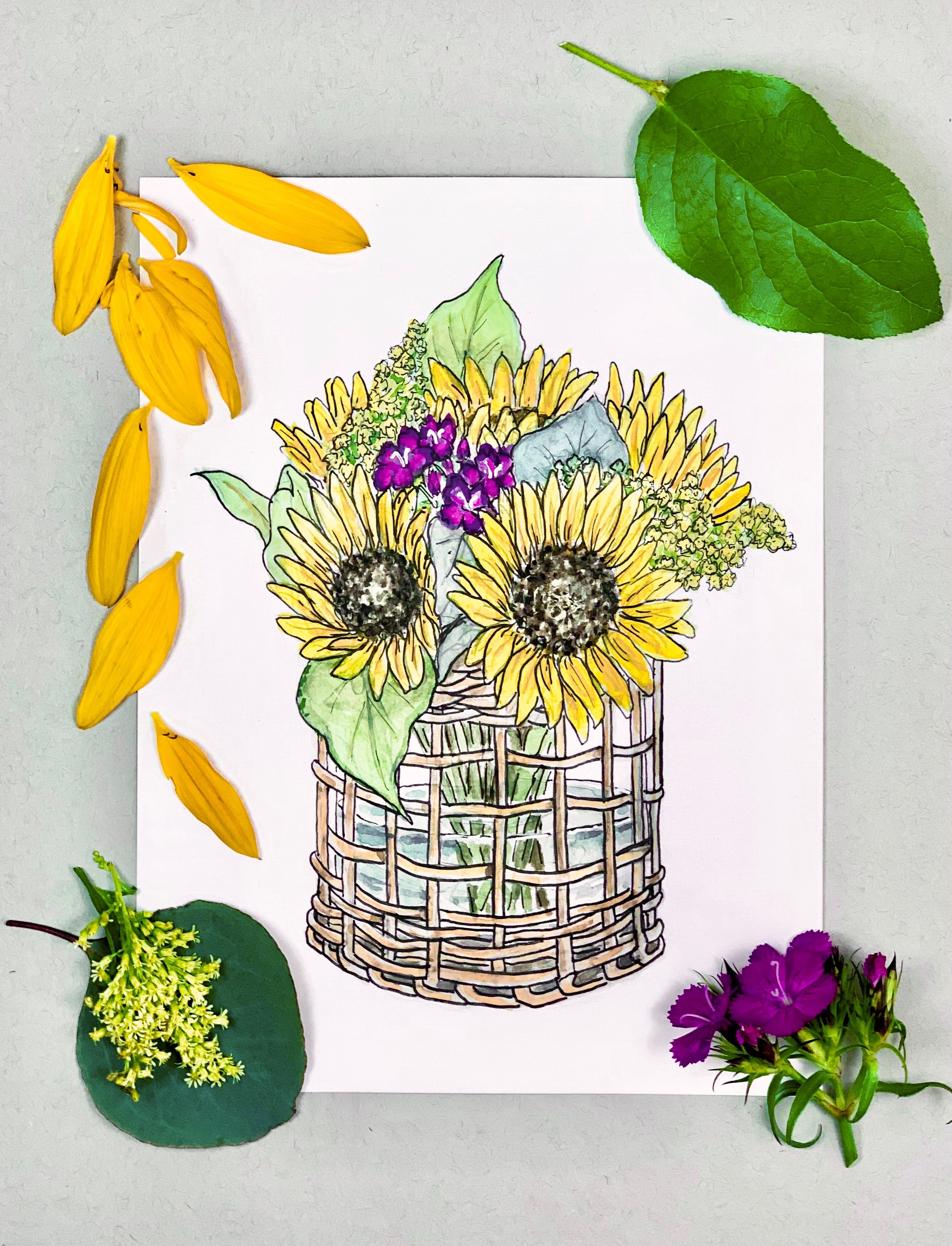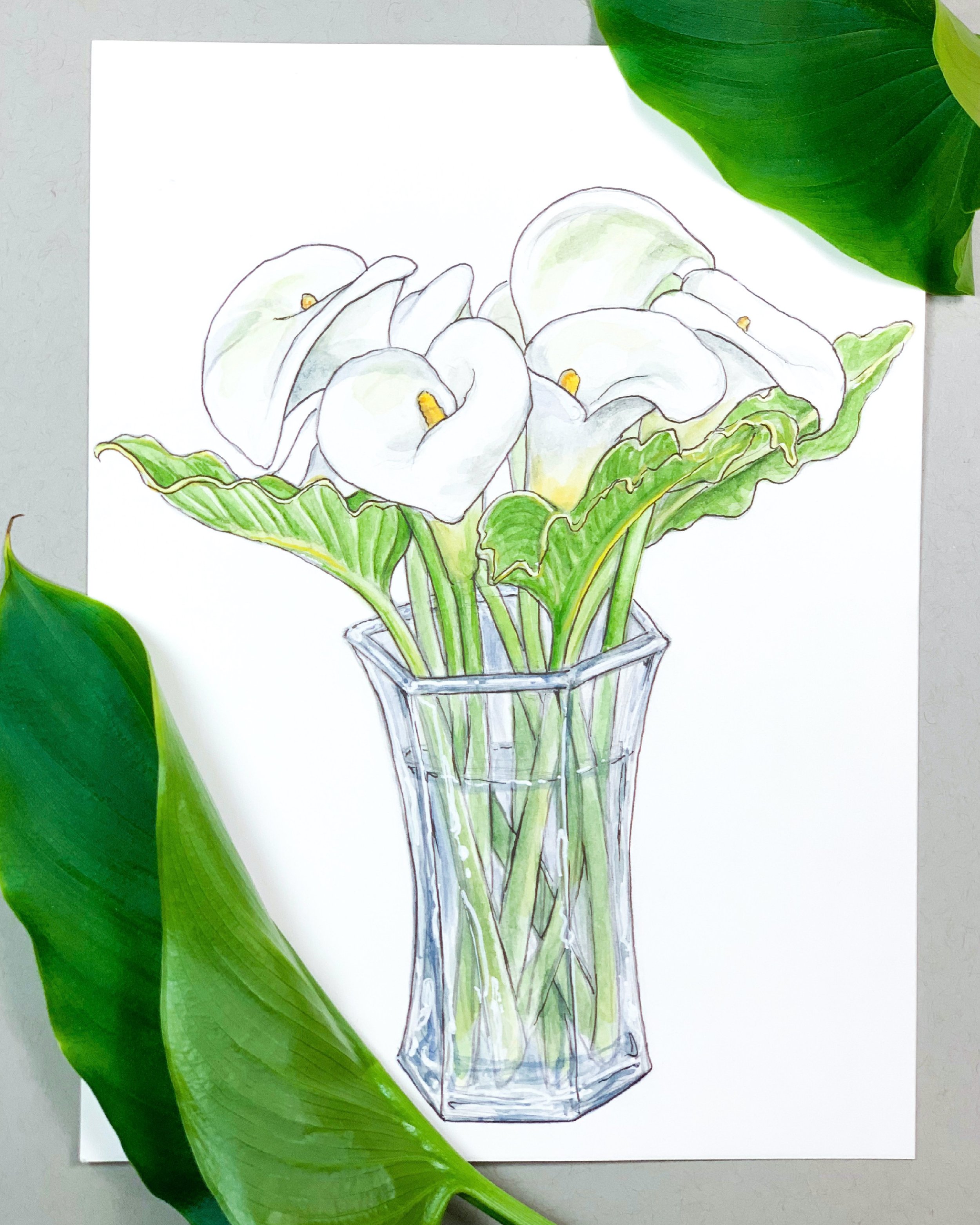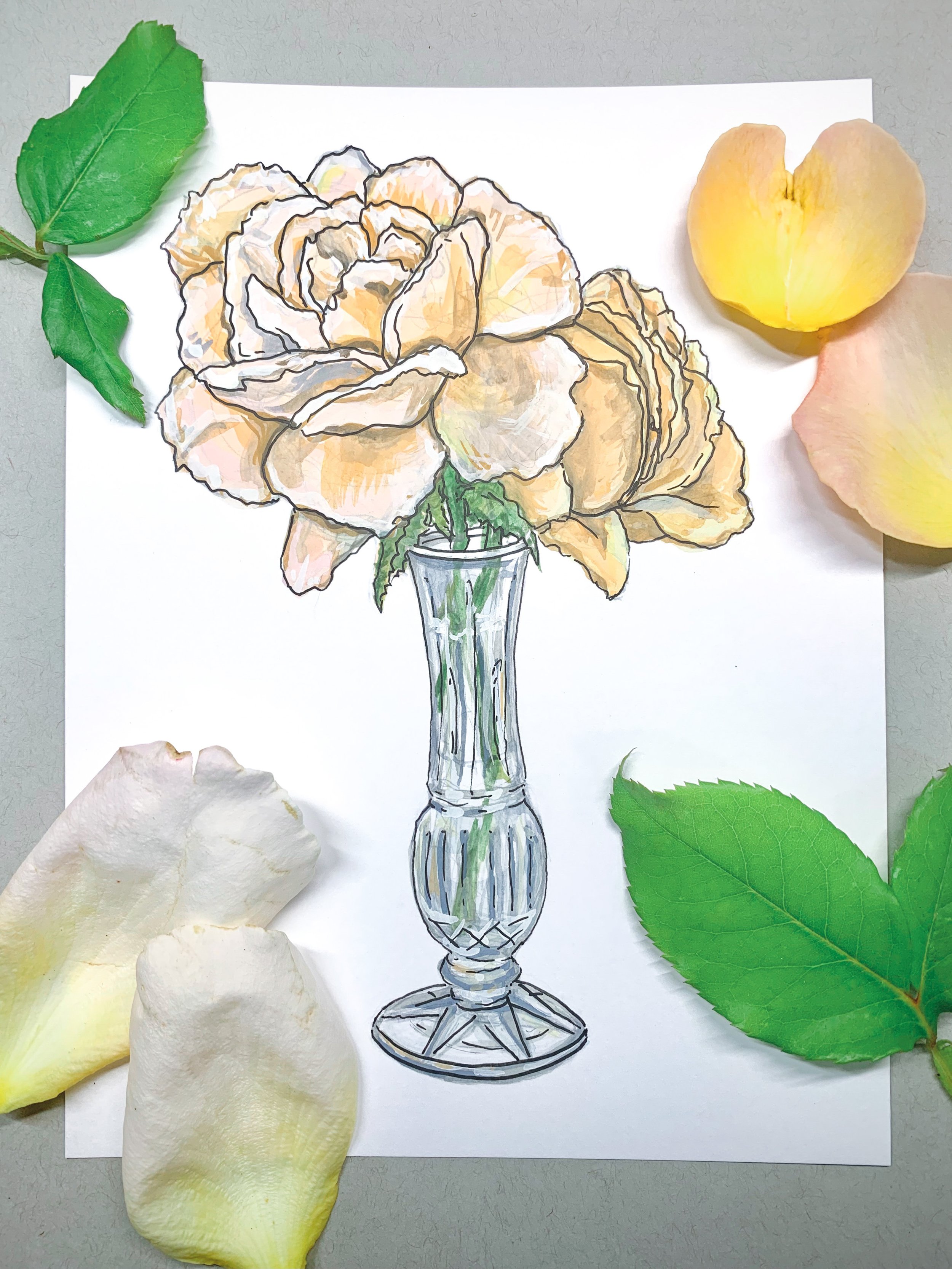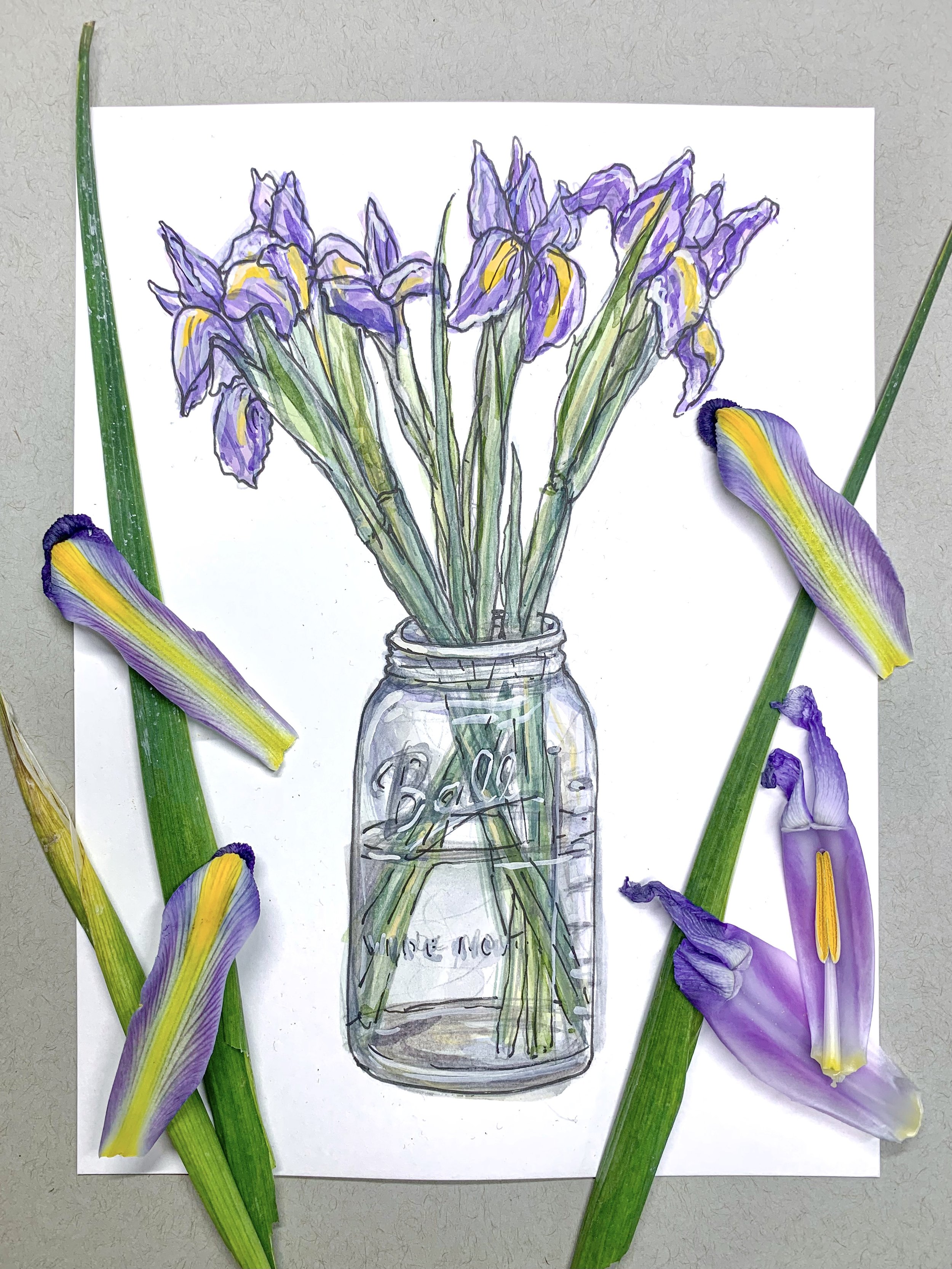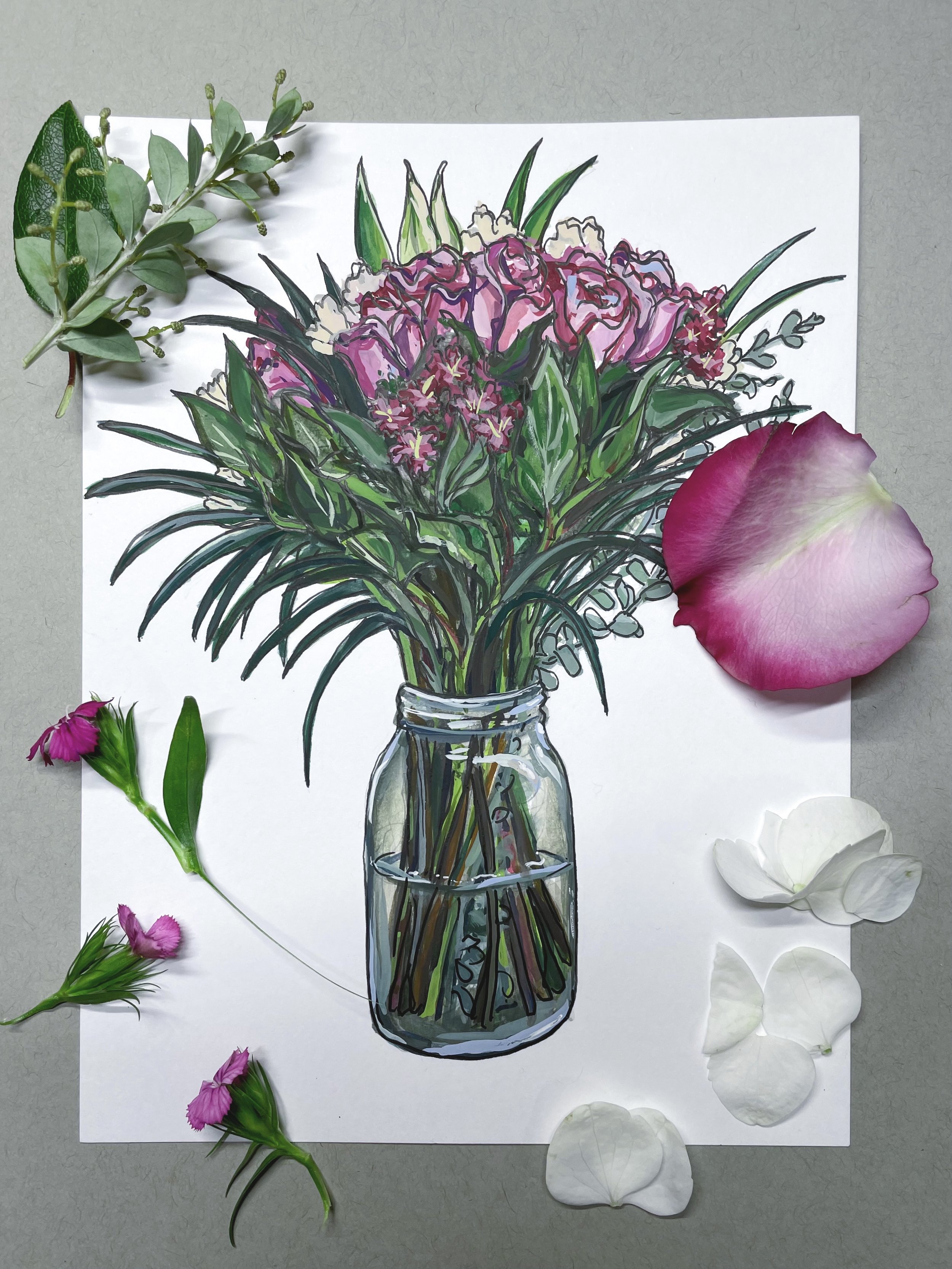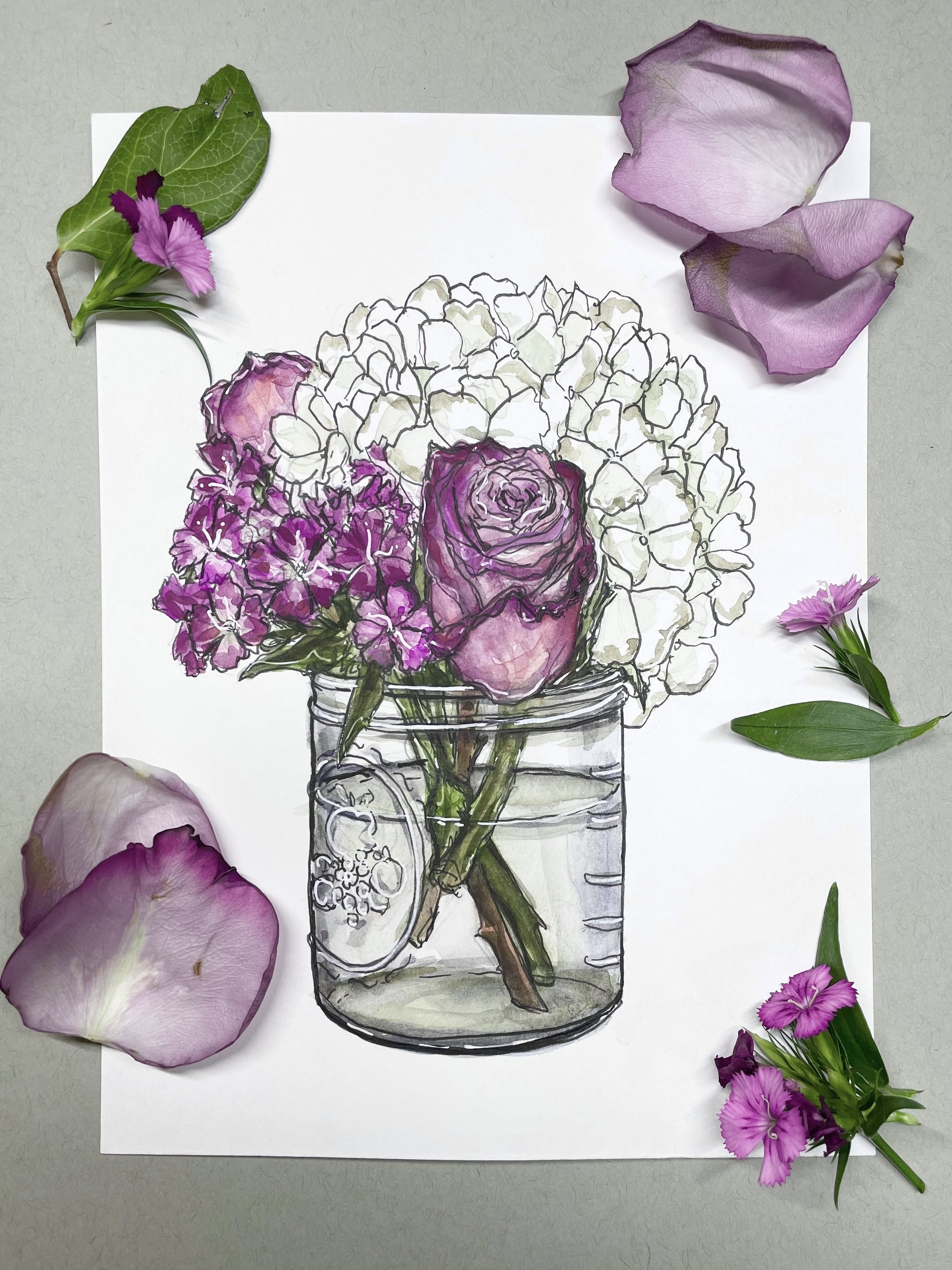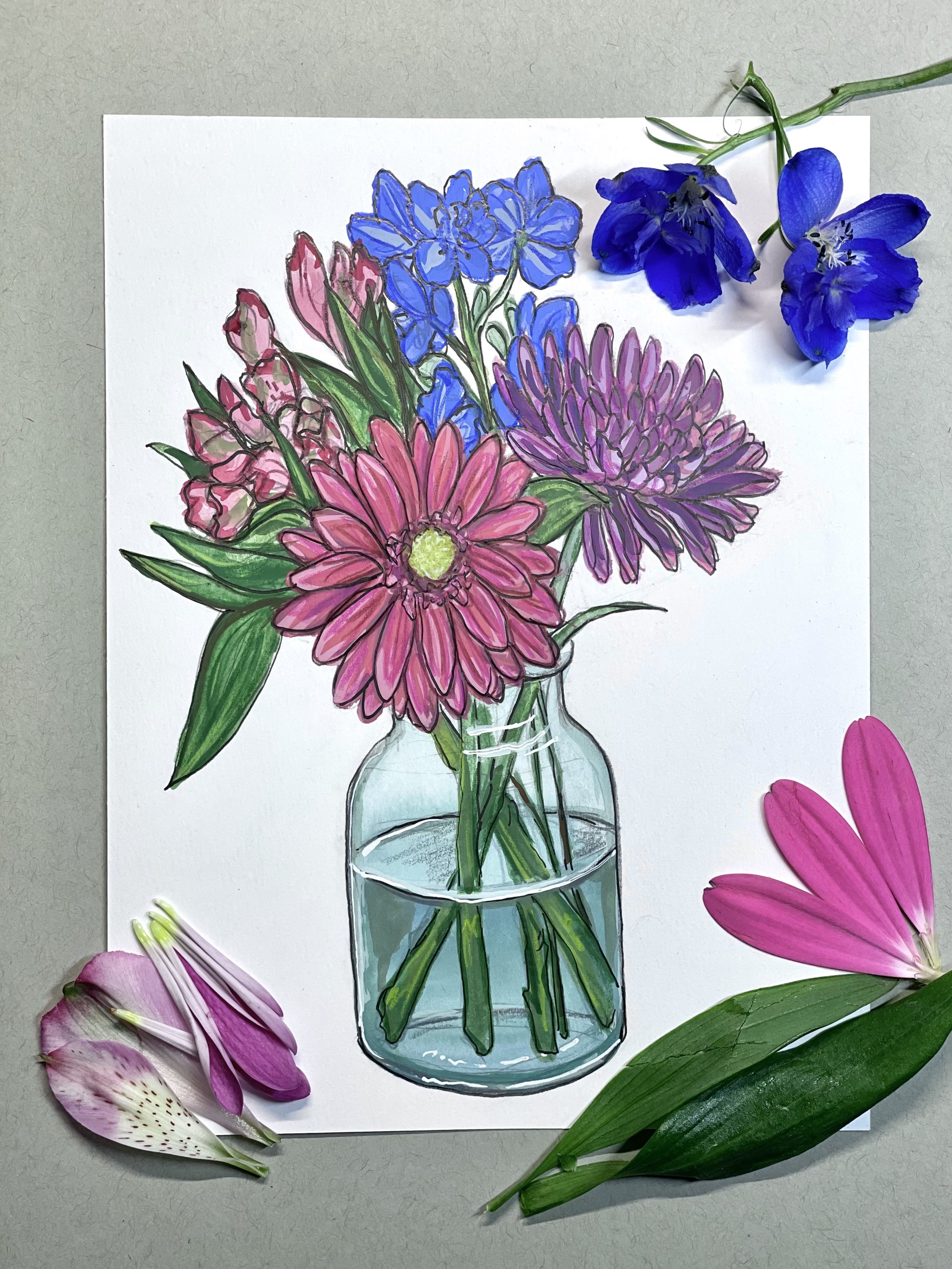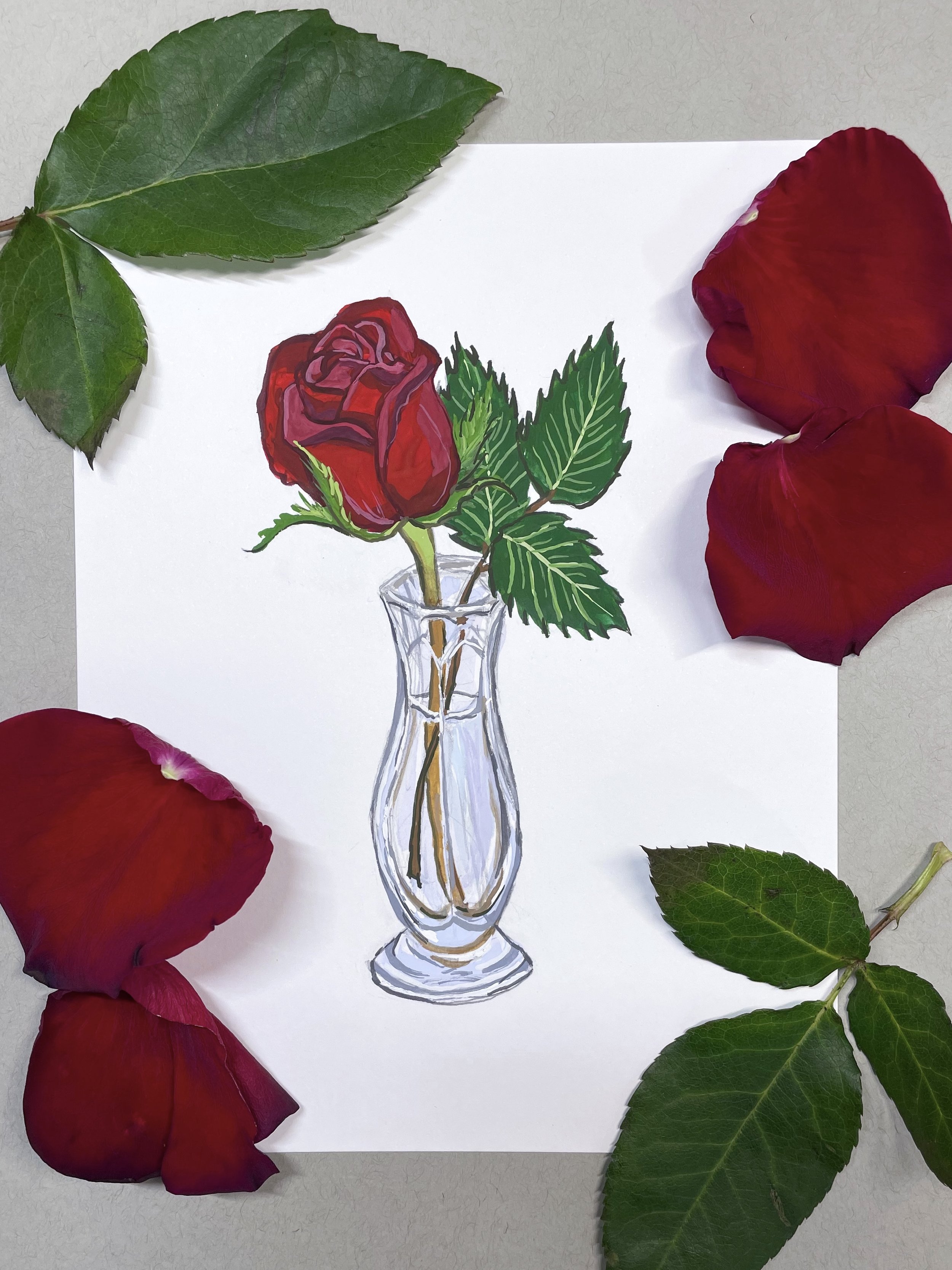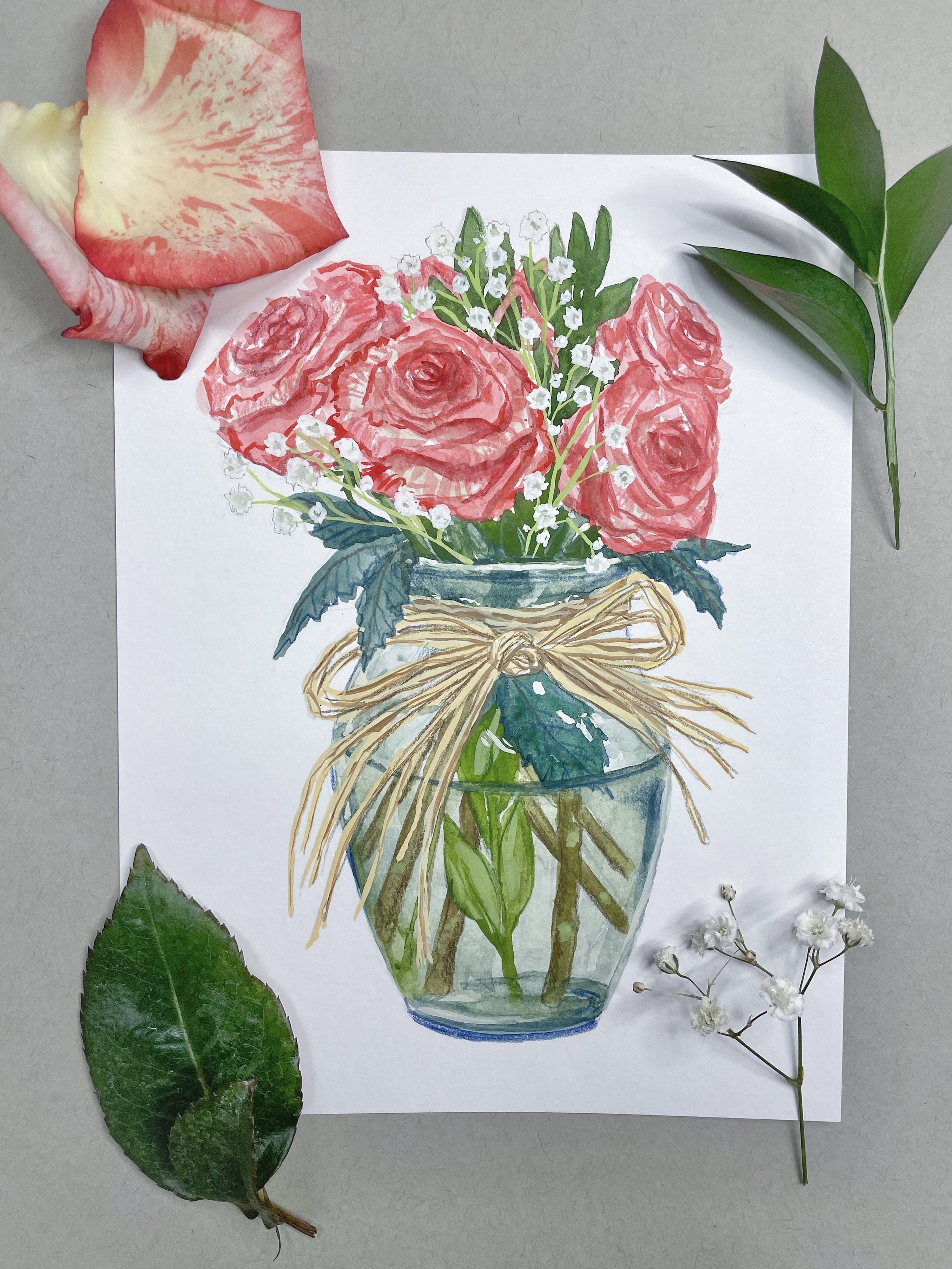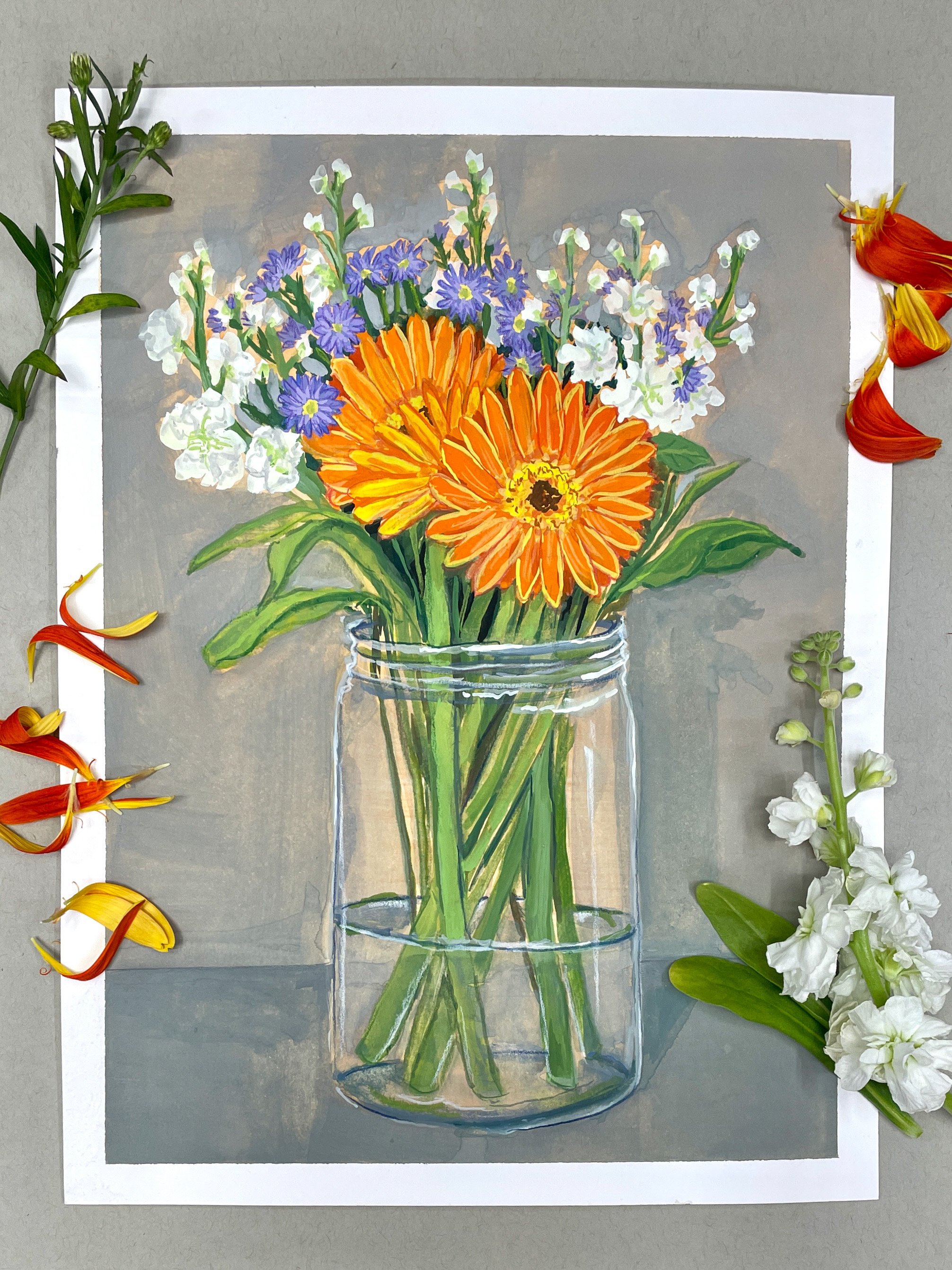Get Well Soon
A continuing series of flower bouquets that I have received and painted along my journey with chronic illness, combined with accompanying text that contextualizes each floral assortment. The series title, “Get Well Soon,” is an allusion to the common (yet well intentioned) misunderstanding that people with chronic illness will “get well,” when in reality, they’re in it for the long haul.
Preview of works in slideshow below:
“Get Well Soon #1” gouache on paper, 5”x 7.5”
I was sent this gorgeous bouquet of flowers as a pick-me-up after a particularly difficult couple of weeks struggling with my chronic illnesses. With all of those beautiful colors, I couldn’t help but sketch it out in my sketchbook and make a painting of it.
“Get Well Soon #2” gouache on paper, 6”x8”
A lush bouquet from my partner to lighten my spirits after a tough week of being weak and symptomatic. We are navigating setting up care at UCLA and starting new therapies and treatments, so it’s been an overwhelming process, but there’s a silver lining of hope that maybe things will turn for the better.
“Get Well Soon #3” gouache on paper, 6”x8”
A third bouquet to add to the series. If you’re thinking this looks familiar, it is. We’ve had a tremendously difficult week with a devastating medical blow, so my partner got me these flowers to paint to distract me. As I was working on them, we noticed they looked oddly familiar. Even though they were purchased a completely different distributor, it appears as though we got an almost identical bouquet as the last one. Oh well, it was a challenge to make an even better piece.
“Get Well Soon #4” gouache on paper, 6”x8”
We are swimming in appointments desperately trying to grasp for answers. Eight last week, four this week. All the while I feel like I’m drowning.
“Get Well Soon #5” gouache on paper, 6”x8”
Another bouquet. Things are getting tough. No one wants to touch this case. It’s unbelievably complicated across every body system. I’m medication and treatment resistant. Nothing is as it should be - a total enigma. And while I’m completely compliant, I am persistent. So I get ping-ponged between doctors; Doctor A says this is Doctor B’s responsibility. Doctor B says this is really in Doctor C’s specialty, and so on, until we run out of alphabet letters. All the while, I keep on getting sicker.
“Get Well Soon #6” gouache on paper, 6”x8”
CDC lifts the mask ban and my partner and I take our first dinner out since the pandemic began a year ago. I boldly (recklessly?) leave my service dog and mobility device behind. I dress up and put on a full face of makeup on despite aching bones and a little voice warning me otherwise - I desperately want to feel normal, a word that now feels foreign on my tongue. I do not take emergency or preventative medication. I eat real food. I eat good food. I haven’t done this in longer than I can remember. We make up silly stories about the other patrons. We get ice cream at Rite-Aid with a coupon and eat it on the curb of a parking lot and laugh belly laughs like when we first started dating twelve years ago. For once in far too long, things feel good.
A few hours pass, and my carriage starts to become a pumpkin. I come home and the dogs start alerting to pain and oncoming seizures. I buckle over from pain in my gut, pain in my muscles, and pain in my bones. Head pounding, my vision starts to black out and I try to stumble to the bedroom. My partner tucks me into bed and I continue to be deliriously sick until 5pm the following day. It is Monday, and I am still hurting for a few hours of normalcy. The pandemic’s restrictions are lifting, and soon people will get to go back to their daily lives, but I feel like my partner and I will be left behind.
“Get Well Soon #7” gouache on paper, 6”x8”
This bouquet that I received comes with a bit of symbolism - blue irises are known as a symbol of hope.
We’re rounding on a year when the first signs of my serious health decline began, and I’ve started a new series to help process a lot of that - the terrifying ER visits and excruciating tests, the rollercoaster months and months of battling side effects and symptoms, and the “there’s nothing more we can do for you” talks. These are the things I have no choice but to brush aside every time I start with a new specialist, hoping for a different outcome.
Looking back, my case has not gotten better. It’s gotten significantly worse. But, what I am learning is how to cope and coexist with my circumstances. I’m connecting with other chronically ill people who have sage advice, I was prescribed a mobility device, and my partner has worked tirelessly to make our living space and our lives more accessible. We may not have any answers, but at the very least, we are learning the art of survival.
“Get Well Soon #8” gouache on paper, 6”x8”
Roses from my mother’s garden.
From an outside perspective, it may seem that the optimism of the last bouquet was misplaced or shortsighted compared to what I’m about to say - it wasn’t. The experience of disability and especially chronic illness is not linear - you don’t get sick and then get better. It’s a roller coaster of peaks and valleys of hope and despair as your care, treatment, and symptoms ebb and flow (or, more appropriately termed, flare and subside).
At the moment, we’re in a valley. I’ve been having increasingly frequent episodes of passing out and not being able to recollect details/fumbling with cognition, and have been in and out of the ER, ultrasounds, CT scans and MRI’s with issues with various systems. My veins are so scarred from constantly being accessed for blood draws, infusions, and contrast dyes that phlebotomists, technicians and ER doctors can’t find anymore viable veins and are recommending a port. We had a month booked solid with appointments (sometimes two or more a day), and we are struggling with specialists who are getting incredibly frustrated, unable to explain why so much of this is happening.
Last night I passed out after an appointment and stopping in a cafe in the city, and don’t remember how I got into bed where I woke up two hours later with tears in my eyes from how much pain I was experiencing.
It will get better, it has to.
“Get Well Soon #9” gouache on paper, 6”x8”
Less of a Get Well Soon bouquet, and more of a sympathy arrangement. In the middle of some difficult personal and health struggles, a very dear friend/father figure, and my grandmother passed away within two days of each other. I have lost people before, but these losses are haunting me. My health struggles have more than doubled down while I have been grieving, causing my pain to flare, and forcing me me to pass in and out between bouts of sobbing.
“Get Well Soon #10” gouache on paper, 6”x8”
A cutting of my sympathy flowers, brought to the UCLA Ronald Reagan Hospital, where I stayed for four days doing an EMU (Epilepsy Monitoring Unit) admission. I was admitted to monitor seizure activity and to develop a care plan for my episodes that have lasted over two years, now. Due to the ongoing pandemic, the ward was incredibly short staffed and overworked. Even though this was the second time I've done this test, I still struggle with hospitalizations due to years of overwhelming medical trauma.
“Get Well Soon #11” gouache on paper, 6”x8”
Moved across the country to uncharted landscapes and seas of grief. I am now faced with rebuilding my medical team, which as someone with major medical trauma, and who has been referred to constantly as a “complex case,”, this feels like an insurmountable task.
“Get Well Soon #12” gouache on paper, 6”x8”
Five weeks of migraine, losing days at a time to a room with black out curtains and endless medications, hoping something sticks. Had IV therapy, but its effects only lasted a day. My body is physically, emotionally, and mentally spent.
“Get Well Soon #13” gouache on paper, 6”x8”
One of the things that isn’t really discussed about having chronic illness, especially living during the pandemic with ME/CFS, is that I am constantly experiencing the classic symptoms of COVID, and also the symptoms of long COVID as well, without having ever contracted it. Fever, chills, shortness of breath, body aches, nausea, vomiting, fatigue, dizziness - it’s been my reality for years. It’s hard to imagine what having COVID on top of my existing conditions would look like, which is why I’ve been so careful.
“Get Well Soon #14” gouache on paper, 6”x8”
Recovering from a surgery that had been delayed for years while my chronic illnesses took the wheel. Naturally, I was allergic to all of the available pain medications, and had to recover only with the help of Tylenol and muscle relaxants, but the recovery process has ended up being fairly smooth. This surgery has the potential to help alleviate some of my chronic pain, and anything that can help make a dent in my pain is a plus in my book.
“Get Well Soon #15” gouache on paper 9”x12”
I’m grateful for the support systems I have in place with my partner, family, and friends, because without them, I would be so very lost in this medical journey with all of its twists and turns, plateaus, and pitfalls.

